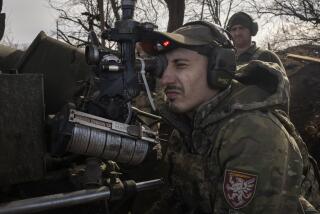Supreme Soviet OKs Gorbachev Plan to Spur Economy
- Share via
MOSCOW — The Supreme Soviet on Tuesday approved a law aimed at reducing central control over industry and giving plant managers more incentive to raise output and improve quality.
It was the first step in a series of measures advanced by Soviet leader Mikhail S. Gorbachev in connection with his campaign for perestroika , or restructuring the stagnant Soviet economy.
Supporters of the plan, which is to take effect next January, called it the most radical reform adopted by the Soviet Union since V. I. Lenin adopted his New Economic Policy in the 1920s in an effort to add a measure of private enterprise to the Communist system.
But Western diplomats said it is much too soon to tell whether the Kremlin is capable of reversing half a century of from-the-top economic decision-making introduced during Josef Stalin’s drive for industrialization and farm collectivization.
The Supreme Soviet, the legislative body that customarily gives an almost ritual stamp of approval to proposals that have been endorsed by the Central Committee of the Communist Party, adopted the law unanimously Tuesday. On Monday there had been token debate.
Enactment came after months of groundwork by Gorbachev and his supporters, who have been expounding the need for fewer directives from Moscow and greater initiative on the part of factory directors and state farm managers.
The new law raises the possibility that factories that fail to show a profit will be shut--without undermining the state’s vow never to tolerate unemployment.
The law also permits factories that accumulate profits to distribute them in the form of higher salaries or additional worker housing, or to invest them in more efficient equipment. It allows the paying of more money to those workers who produce more and no ceiling on what a worker may earn.
In addition, it requires the election of factory directors by the workers as part of Gorbachev’s effort to democratize the workplace.
Other measures, expected to be adopted in the months ahead, will call for “radical reform” of the pricing system. Government economists have suggested that this might mean a reduction of state subsidies for such everyday items as meat and bread, but they have promised that living standards will not be reduced.
Gorbachev’s program was given strong backing Tuesday by President Andrei A. Gromyko, 77, who has managed to survive every Soviet leader since Stalin. Gromyko, reviewing policies that have not been changed since the 1930s, said they contained “deformities” that allowed over-centralization and that this has impeded economic progress.
“Every Soviet citizen has to embrace the perestroika in his mind and heart,” Gromyko told the Supreme Soviet. “This is the only way to success.”
Gromyko, who for most of his career specialized in foreign affairs, in his speech Tuesday championed environmental protection, stronger law enforcement and better consumer goods and services.
In addition, he introduced a law, also approved unanimously, that will require more glasnost , or openness, on questions that arouse strong popular feelings.
The Supreme Soviet also adopted a law, to take effect in January, that will broaden the right of appeal for citizens who complain of official abuse of authority. It will permit citizens to go to court if their complaints are rejected by their superiors or a public body.
The heart of Gorbachev’s program is the law concerning industrial enterprises and state farms. Gorbachev hopes it will revitalize the economy by applying market forces in place of government directives.
State and party will continue to exercise guidance in economic planning, but the law represents an effort to prevent second-guessing of factory managers by ministries in Moscow.
Gorbachev has blamed Nikolai V. Talyzin, the head of Gosplan, the state planning agency, for a slowdown in economic activity early this year, but Western observers suggest that the slowdown could be attributed for the most part to a period of extremely cold weather.
The main Kremlin theme now is that the poor results stemmed from poor organization rather than from any individual’s mistakes.
Premier Nikolai I. Ryzhkov said Monday in an address to the Supreme Soviet: “The methods of the past system of economic management have become obsolete. The need for change is urgent.”
Gorbachev has said that it may take two or three years to get his system working properly but that he wants it ready in time for the next five-year plan, which begins in 1991.
More to Read
Sign up for Essential California
The most important California stories and recommendations in your inbox every morning.
You may occasionally receive promotional content from the Los Angeles Times.













